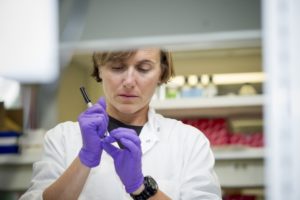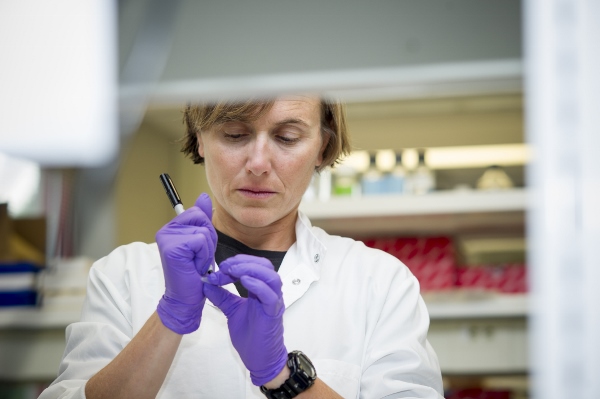
ITHACA, N.Y. – Researchers are exploring the use of stem cells to treat skin wounds in horses with techniques that may eventually translate to human patients.
Rebecca Harman and a team of researchers in the Van de Walle Lab at the Cornell University College of Veterinary Medicine are finding that factors secreted by adult stem cells, also known as mesenchymal stromal cells (MSC), are able to fight bacteria commonly found in skin wounds.
Bacteria often complicate the treatment of chronic skin wounds in humans, driving a need for new therapies that reduce bacteria in wounds. Although previous research has explored the therapeutic value of MSC in wound healing, few studies examined the potential for MSC to inhibit bacterial growth. Harman and the Van de Walle Lab are examining the antibacterial properties of equine MSC secreted factors, like antimicrobial peptides, to develop therapies for horses and to serve as a model for human studies.
“This equine skin wound healing model offers a readily translatable example for MSC therapies in humans,” said Harman, a research support specialist at the Baker Institute for Animal Health. “Although mice are smaller and less expensive model organisms, the horse is more physiologically relevant when it comes to human skin wound healing.”

MSC are already commonly used as a biologic therapy for equine joint and tendon injuries. Practitioners isolate MSC from bone marrow and inject them at injury sites. However, bone marrow extraction is an invasive technique, and injection-site complications – such as immune responses against the MSC – may reduce the efficacy of the therapy.
Harman’s work sidesteps these issues by isolating MSC from blood rather than bone marrow, making the collection of MSC less invasive. In addition, she is applying the factors secreted by MSC, rather than the cells themselves, to the wounds, which reduces the chance of a host immune response against the therapy.
MSC provide a range of benefits that extend beyond those of conventional antibiotics. Their secreted antimicrobial peptides can directly inhibit the growth of bacteria in skin wounds, and other secreted factors fight bacteria indirectly by attracting resident immune cells that are primed to clear pathogens.
By further experimenting with different delivery methods, the lab’s research may make things easier on the practitioner as well. The antimicrobial peptide molecules secreted by MSC have proven to be fairly stable and can maintain their activity through a variety of conditions, such as extended freezing or being dried into a powder. This enables long-term storage options that are more efficient for practitioners than having to isolate MSC and collect secreted factors every time a wound needs to be treated.
The research team will soon partner with Bettina Wagner, chair of Population Medicine and Diagnostic Sciences at the College of Veterinary Medicine, to begin in vivo testing on her equine herd. Every summer, Wagner’s Icelandic horses naturally develop skin wounds as part of an allergic reaction. The wounds will be directly treated with the secreted factors of MSC and the lab will monitor bacteria levels over time to see if there are differences between treated and untreated wounds.
“What we learn from the Icelandic herd about the wound-healing properties of MSC secreted factors could reasonably be tested in human medicine,” said Harman.

News from the horse industry. Sharing today’s information as it happens. The Northwest Horse Source is not responsible for the content of 3rd party submissions.





